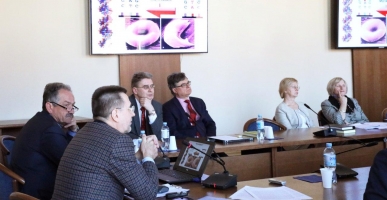Events
Genome Editing: Challenges and Possibilities
03 05 2019
The conference-discussion ‘Genome Editing: Challenges and Possibilities’ was held at the Lithuanian Academy of Sciences on 25 April 2019. It was organised by the Division of Biological, Medical, and Geosciences and the Division of Agricultural and Forestry Sciences of the Lithuanian Academy of Sciences, Vilnius University, and the Lithuanian Research Centre for Agriculture and Forestry. The opening addresses were delivered by Prof. Jūras Banys, President of the Lithuanian Academy of Sciences, and heads of the divisions, Prof. Zenonas Dabkevičius and Prof. Vaidutis Kučinskas.
Prof. Virginijus Šikšnys of Vilnius University introduced genome editing technologies and noted that they opened unlimited possibilities, both in medicine and agriculture. In plant selection, the path of genome editing is considerably shorter than it is in medicine. Genome editing is a controlled process and it should not be attributed to genetically modified organisms (GMO).
Prof. Dr Gintaras Valinčius of the Vilnius University Life Sciences Centre discussed the economic benefit resulting from the application of CRISPR technologies. Politicians are not resolute enough to approve the application of the CRISPR method, although the founders of a large number of the companies capable of applying the CRISPR method (Thermo Fisher and others) are scientists who are ready for its successful application. These companies work with innovative and safe technologies, produce bio-products of high added value, and are among the largest taxpayers. The speaker emphasised that it would be appropriate to develop a centre for genome editing technologies and competence in Lithuania to do research and conduct business.
Dr Gintaras Brazauskas of the Lithuanian Research Centre for Agriculture and Forestry gave an overview of the experience and prospects of application of genome modification and editing methods in agriculture and pointed out that ten genetically modified plant species are currently cultivated in the world. GMOs are cultivated by 24 countries and imported by 43 countries, and the European Union is among the latter. EU Regulation of 2015 gives the member-states freedom in making their choice regarding the cultivation of GMOs. Unlike GMOs, the application of gene editing methods meets consumer expectations and is safe, and for this reason, restrictions applied to GMOs should not be extended to gene editing methods.
In introducing genome modification and editing research in horticulture and olericulture, Prof. Vidmantas Stanys noted that fruit and vegetable qualities beneficial to consumers were developed with the help of gene editing. Gene editing is characterised by extremely high precision. This method helps to develop such plant- and consumer-useful qualities as plant resistance to viruses and to enrich them with beneficial effects.
Participants in the discussion agreed that gene editing is an innovative technology that significantly expands current possibilities in developing enhanced-quality products and in taking care of the health of humans and animals. Since it is highly important to explain the possibilities and advantages of gene editing technologies to the general public and to decision-makers, the conference adopted a resolution that was signed by Prof. Jūras Banys, President of the Lithuanian Academy of Sciences, Prof. Artūras Žukauskas, Rector of Vilnius University, Dr Gintaras Brazauskas, director of the Lithuanian Research Centre for Agriculture and Forestry, and Prof. Virginijus Šikšnys, one of the designers of this technology and a recipient of the Kavli Prize. The resolution was approved and signed by 28 conference participants – members of the Lithuanian Academy of Sciences, professors, PhDs, and specialists.
Information of the Division of Agricultural and Forestry Sciences, and of Biological, medical, and Geosciences
